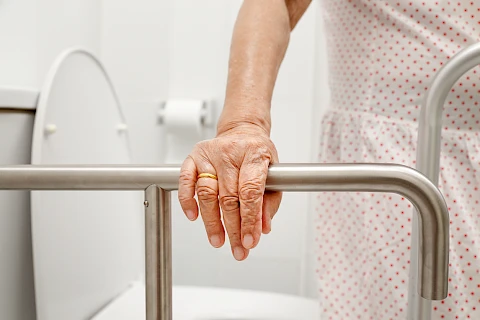
As our loved ones age, ensuring their homes are safe becomes increasingly essential. This responsibility often falls on the shoulders of caregivers, who must navigate an array of potential hazards. That's why we've created this comprehensive home safety checklist focused on fall and winter precautions to keep seniors secure and comfortable. We'll walk you through essential areas like fall prevention, heating safety, lighting, and more.
Fall Prevention
Falls are one of the most common hazards for seniors, but they can often be prevented with some simple adjustments.
- Clear pathways and remove clutter: Make sure all walkways are free from obstacles like furniture, shoes, or cords.
- Secure rugs and carpets: Use non-slip pads under rugs or consider removing them altogether.
- Install grab bars and handrails: Place these in high-risk areas like stairways and bathrooms to provide extra support.
- Ensure proper footwear: Encourage the use of non-slip shoes or slippers to avoid slips and falls.
Heating Safety
Winter can be harsh, especially in New Hampshire. Keeping warm is important but must be done safely. Regular maintenance of heating systems is crucial, so have your furnace or boiler checked annually by a professional. When using space heaters, keep them at least three feet away from anything flammable and never leave them unattended. Install carbon monoxide detectors in sleeping areas and check the batteries regularly. Proper ventilation is also essential, so make sure that chimneys and vents are clear to prevent the buildup of dangerous gases.
Lighting
Good lighting is essential for senior safety, particularly in the darker months of fall and winter. Ensure that every room has sufficient lighting, including the kitchen, bathroom, and stairways. Install night lights in hallways and bathrooms to help prevent falls during nighttime trips. Consider adding motion-sensor lights for outdoor areas to provide better visibility and deter intruders. Make sure that light switches are easily accessible, preferably at the entrance of each room.
Bathroom Safety
The bathroom can be particularly hazardous for seniors, but making a few changes can significantly reduce risks. Place non-slip mats in the shower and bathtub to prevent slips and provide stability. Consider installing elevated toilet seats, which are easier for seniors to use without strain. Accessible shower chairs provide a safe place to sit while bathing. To prevent accidental burns from hot water, install temperature-regulated faucets.
Kitchen Safety
Navigating the kitchen can pose various dangers, but some proactive steps can make it much safer. Organize frequently used items within reach to avoid the need for stools or extra stretching. Use automatic shut-off appliances to prevent accidents if they're accidentally left on. Keep a fire extinguisher close by and ensure everyone knows how to use it. Store knives and other sharp items in secure, easy-to-access locations.
Emergency Preparedness
Emergencies can happen at any time, and being prepared is key to ensuring safety. Have a list of contacts where seniors can easily find it. Keep a well-stocked first aid kit accessible. Test smoke detectors regularly and replace batteries as needed. Develop and practice an emergency evacuation plan for quick and safe evacuation in case of an emergency.
We Can Help Seniors With Daily Activities
Ensuring a safe home environment for seniors is vital to their well-being and independence. By implementing this checklist, caregivers can provide a more secure living space, reducing the risk of falls and other hazards.
If you're in Manchester, Derry, Nashua, or Salem and need professional assistance, contact Senior Helpers Southern New Hampshire. We are here to support you in creating a safe and comfortable home for your loved ones.